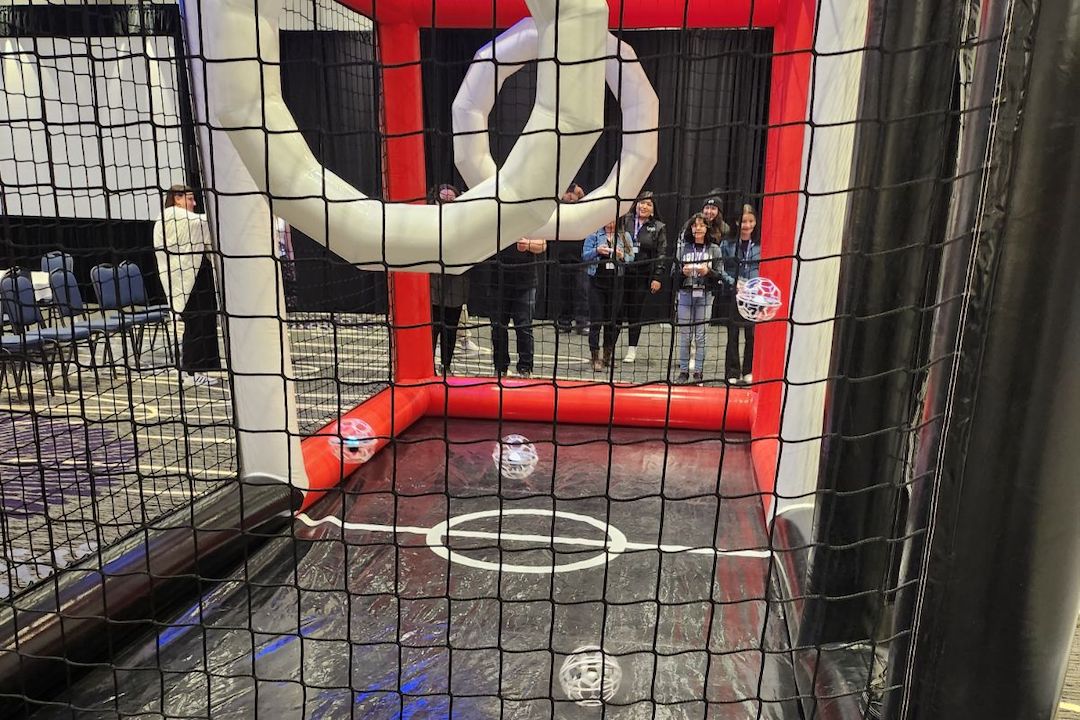A security company owned by the Papaschase First Nation is using a drone soccer club to build STEM skills and generate interest in jobs as drone pilots in the security industry, as well as awareness about the nation itself.
"In one of the grant opportunities that we had with Papaschase First Nation, there was a capacity to bring in the drone soccer as part of a program to introduce it to the community in a youth environment," Mark Palka, manager for Papaschase Security Services, which trains and employs guards, told Taproot. "That's how this started getting some traction."
Three inaugural members, all minors, run the new club. The trio is working to establish the club's bylaws, raise funds, and recruit members before formalized play begins. Palka said the club is open to all youth, not just Papaschase members. The Papaschase First Nation hopes the club also builds awareness about the nation, Palka said.
The Papaschase First Nation is a nation of Indigenous people who were displaced by settlers in what is now part of southern Edmonton in the late 1800s. The nation has worked to be recognized and see land returned.
The drone soccer club launched on May 10 with an open house for the security company. On June 21, the club will make a public debut when its members offer two demonstrations of drone soccer as part of a National Indigenous Peoples Day celebration at the TELUS World of Science.
One of the reasons Palka wanted to launch the club was to create a career path for drone pilots, as it's a role with growing opportunities. That's something he does as the director of Project Safe Canada, a non-profit that offers drone training among other things.
Palka said when he helped establish Papaschase Security Services in 2018, workers expressed low interest in the security profession. But, he said, adding the challenge of piloting drones to the role spiked the excitement. "We trained about 1,400 security guards across Alberta and Saskatchewan, and we found out a lot of them were not working," he said. "They did not consider it to be meaningful employment. When we brought in electronics and security, and particularly when we mentioned drones, the needle kind of went off the charts."
But what is drone soccer? There are different sets of rules for the emerging sport in different jurisdictions, but essentially players fly drones carrying balls through a circular goal inside a mesh arena. Drones for the sport do not require a licence because their flight is contained within an arena, and one of the drones at the club's disposal is small enough to be flown outside the arena without a licence.
The club "starts with a game similar to Quidditch from Harry Potter, but from there, it moves to building drones and learning all aspects of an aircraft, including flight, lift," Palka said in an email. "We teach about (lithium polymer) batteries, how to use and store them, and students learn how to program and code the drones."
Palka recalled a mother who brought her two kids to the Papaschase Security Services office before the club launched. Without training, the children could fly the drones and even program them. These same youth have become the club's first two members and already have momentum, Palka said. "(The members are) taking the ball and running with it, and they have all kinds of ideas. They went and made some hoodies up and … they're looking at it as a business model as well."

The drone soccer club at Papaschase Security Services is as much about playing as learning. Members develop STEM and aviation skills, and learn to run their own organization through participation. (Supplied)
Palka (who is not Indigenous) and some of his colleagues from Project Safe Canada made founding investments in Papaschase Security Services in 2018, but it's owned by the Papaschase First Nation.
At the time, drones were only starting to be licensed in Canada, Palka said.
"There weren't enough jobs out there with drones, but we had a lot of training with them," he said. "We found out that search and rescue for fire departments and stuff like that was working quite well."
Training offered by Project Safe Canada and Papaschase Security Services meets Transport Canada's standard for licensed drone operations. Project Safe Canada is also a part of Transport Canada's working group on new legislation for flying drones beyond the visible line of sight. Palka said new, less stringent rules are likely to arrive by the first quarter of 2025.
"(Project Safe Canada) has over 600 pilots that we have trained in Indigenous communities, so we have a little bit of credibility with the government and with Transport Canada," he said. "When we bring some of our ideas forward, we at least get an audience there."
That means what Papaschase Security Services and Project Safe Canada can do may grow in the near future. In the meantime, Papaschase Security Services is working with Métis Housing to offer drone security during the construction of a new development. Palka said the drone soccer club may add more drones to its eight-aircraft fleet soon, and the club will eventually look at learning to perform drone light shows.
